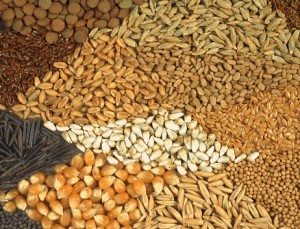Ghana’s indigenous seeds face extinction due to GMO, influx of hybrid seeds – Stakeholders
 Stakeholders, including Civil Society Organisation and Academia, have raised concerns over a possible extinction of Ghanaian indigenous seeds.
Stakeholders, including Civil Society Organisation and Academia, have raised concerns over a possible extinction of Ghanaian indigenous seeds.
The stakeholders, notably the University of Energy and Natural Resources, ActionAid Ghana and the Centre for Indigenous Knowledge and Organisational Development, have attributed the extinction to changing preference for food taste and the influx of hybrid seeds.
In a media statement copied to the Ghana News Agency, the stakeholders said the extinction was also fuelled by the lack of government policies and programmes to guide and provide the framework to safeguard, multiply, and protect key indigenous seeds from extinction.
They also reckoned that the promotion of genetically modified organisms (GMOs) and other patented technologies created legal and economic barriers for smallholder farmers, limiting their rights to save and exchange seeds.
The stakeholders said other institutional framework such as the ramifications of the approval for the recent commercialization of 14 Genetically Modified Organism (GMO) products, by the National Biosafety Authority in Ghana would further exacerbate the extinction of key indigenous seeds.
The statement said following deliberations at the seminar, ActionAid Ghana and Partners made recommendations to the Government, through the Ministry for Food and Agriculture, to take steps to urgently promulgate the formulation of policies and programmes that targeted all food crops.
The stakeholders emphasised that the policies must include neglected local and indigenous crop varieties known to be more adaptable to local conditions with high nutritional value.
“This will continue to protect and preserve indigenous seeds rather than promote hybrid seeds and other genetically modified organisms and products,” they said.
The stakeholder further recommended an effective sustainable agricultural system by improving Planting for Food and Jobs phase II to incentivize local indigenous seed production through increased investment in agroecology in Ghana.
They urged Civil Society Organizations (CSOs) and other like-minded organizations to intensify their advocacy for the rejection of the 14 GMO products that were recently approved by the National Biosafety Authority (NBA) and any other approvals to safeguard indigenous seeds in Ghana.
The stakeholders said smallholder women farmers played a crucial role in maintaining and improving indigenous seeds in Ghana.
Hence, they argued that the Government policies and programmes should be geared towards providing the requisite technical and financial support to play a key role in the identification, protection, and preservation of indigenous seeds.
They said concerted efforts needed to be encouraged to sensitize citizens to use and patronize local seeds and food to safeguard the heritage, and culture and achieve food sovereignty.
Source: GNA
